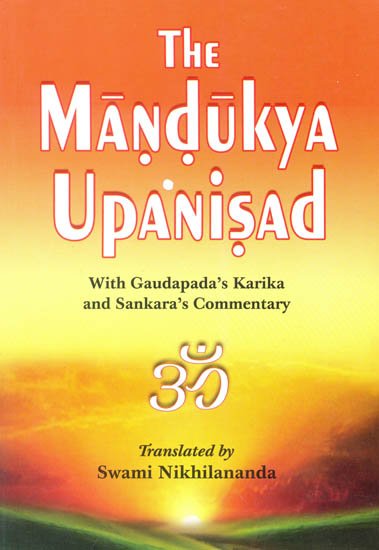Mandukya Upanishad (Gaudapa Karika and Shankara Bhashya)
by Swami Nikhilananda | 1949 | 115,575 words | ISBN-13: 9788175050228
This is the English translation of the Mandukya Karika by Gaudapada, which is a commentary on the Mandukya Upanishad. The school of philosophy this book attempts to expose is ‘Advaita Vedanta’, a non-dualistic path to spiritual realization of the self. Many of the verses from the Karika attempt to illustrate the identification of the Atman (self) ...
Invocation
Aum Salutation to Brahman
THE MĀṆḌŪKYOPANIṢAD
Vedic Invocation
O Gods (Devā)! Auspicious sounds may we hear with the ears. Auspicious forms may we behold with the eyes. May we, full of praise of the Highest, enjoy, in healthy body with perfect limbs, our allotted years, (may we be) the beloved of the Gods.
Aum Peace! Peace! Peace!
Invocation by Śaṅkara
I bow to that Brahman that (during the waking state) after having enjoyed (experienced) all gross objects by pervading the entire universe through the omnipresent rays of its immutable consciousness that embraces the entire variety of the movable and the immovable objects; that again, after having digested, as it were,—that is to say, experienced within (in the dream state)—all the variety of objects produced by desires and brought into existence by the mind, enjoys bliss in deep sleep and makes us experience through Māyā, the bliss; which, further, is designated, in terms of Māyā, as the fourth (Turīya), and which is supreme, immortal and changeless.
May that Turīya that, (through Māyā) having identified itself as the entire universe, experiences (in the waking state) the manifold gross objects of enjoyment through ignorance and attachment, that again during the dream state, experiences, being enlightened by its own light, the subtle objects of enjoyment, the objects that are brought into existence by its own internal organ, and which, lastly, in dreamless sleep withdraws all objects (subtle as well as gross) within itself and thus becomes free from all distinctions and differences,—(May this Turīya that) is ever devoid of all attributes, protect us.
